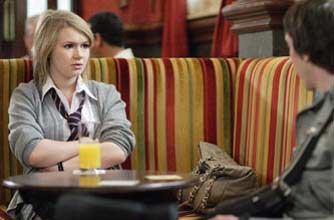Could your teen be cheating in their exams?
EastEnders' character Lucy has been cheating in her GCSE exams by buying exam papers - we look at the modern ways of cheating and whether your teen could be doing it

EastEnders' character Lucy Beale has been cheating in her GCSE exams by buying the exam papers.
While cheating is very rare, there are a few teenagers who still try to do it - and it's not just by putting notes in their pencil cases any more.
Today's ways of cheating
It's very unlikely that students would actually be able to buy exam papers in advance of the exams - because exam boards are very careful to keep them top-secret, but there are more ways to cheat now then when we were at school.
New technology
Mobile phones, MP3 players and iPods are all banned from exam halls now. If a teen is caught with a mobile phone, they could be disqualified from that exam and the examining board could decide to cancel all their results.
Taking in notes
In the past few years, exam boards have clamped down on students taking notes into exams with them. Some exams used to allow students to take in books with their own notes written in, but this has now been banned in lots of exams. Where a book is needed for an exam, students will be given a clean copy to take in.
Also banned are labels on water bottles, writing on desks or hands and calculator lids. Pencil cases have to be completely see through and no spare paper is allowed either.
Cheating on coursework
Most subjects require coursework, not just exams and schools have also clamped down on cheating on these. Websites where you can buy coursework do exist - but they cost money and students are likely to be found out if they use them.
When handing in coursework, students need to sign to say the work is all their own and they have to declare any sources they've used.
GoodtoKnow Newsletter
Parenting advice, hot topics, best buys and family finance tips delivered straight to your inbox.
Is cheating getting more common?
In 2009, cases of cheating did increase on the previous year. 4,415 students were penalised for trying to cheat - and there was a rise in the number of people trying to bring in electronic equipment like mobile phones and MP3 players. These students either had their marks deducted, had exam results cancelled or were given a warning.
However, a spokesperson for the Department of Education said cheating is still very rare - only 0.03% of students tried to cheat in exams in 2009: 'Cheating in exams is unacceptable, Centres, staff and students should get the grades that reflect the work they have put in.
'Any kind of cheating, be it use of mobile phones, communicating with other candidates or copying their work, compromises the integrity of the exam system. Ofqual is committed to working with the awarding bodies to tackle it in all its forms.'
James Whitlock, 16, has just completed his AS levels and thinks people are too scared to cheat: 'I think exams have got a lot more strict, when my sister did her exams three years ago she was allowed to take in annotations in books, but the exam boards have changed the rules.
'I think cheating is really rare because everyone is scared to get caught. A couple of years ago at my school someone had their phone with them in an exam and the exam board cancelled all their exams.'
More exam help and advice
Some teens find exams very stressful, so use our guide on how to spot a stressed teen to make sure your kids aren't feeling overwhelmed.
We've also got advice on how to help your kids revise and when results come out, don't forget to check out our parents' guide to exam results